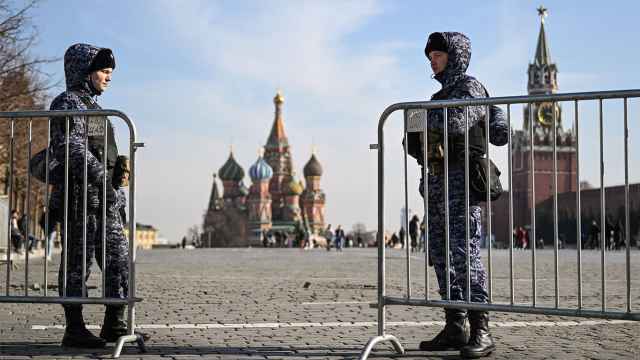Moscow’s decision to defy a second wave of the coronavirus and keep its economy firing helped the country’s largest companies book a strong end to the year and cement their recovery from the early blows of the coronavirus pandemic, analysis of company results shows.
Over the full year, corporate profits at Russia’s large and medium-sized companies dropped by around a quarter, according to data from Russia’s official statistics agency (Rosstat).
While the total came to 12 trillion rubles ($162 billion), having fallen by more than 50% last spring, it was a better performance than the most optimistic estimates. In fact, almost half of Russia’s entire corporate profit was chalked up in the fourth quarter, as the country removed the strictest coronavirus restrictions and global optimism over vaccines helped push worldwide energy prices back above their pre-coronavirus levels.
Survivors
The turnaround for Russia’s businesses was celebrated by Rosneft CEO Igor Sechin in a boast to President Vladimir Putin about his company’s performance during a recent meeting — an almost unthinkable prospect 12 months ago as oil prices crashed below $20 a barrel.
“In contrast to a number of the other major international oil and gas companies, including ExxonMobil, Chevron, Shell and Total which ended the year with losses, we were the only global company that was profitable,” Sechin told Putin in a face-to-face meeting last month.
Earlier in the pandemic, Rosneft had become a poster child for Russia’s corporate woes when it recorded an eye-watering $2.1 billion loss in the first quarter of the year. It closed out the year with a $2 billion annual profit — 80% down on 2019, but pushed into the black by a turnaround in oil prices and a multi-billion dollar sale of a stake in its vast Arctic Oil initiative in the final weeks.
With oil prices now above their pre-coronavirus levels, analysts believe the outlook for Russia’s energy majors is relatively bright. Investment bank VTB Capital recently slapped a “strong buy” rating on the entire sector.
Sberbank — Russia’s most valuable company — is another testament to the corporate turnaround Russia experienced in the second half of 2020. After earnings crashed during the country’s national lockdown last spring and monthly profits approached zero, the bank bounced back strongly, recording a $10 billion windfall for the full year.
The lender started this year where it left off, breaking records for earnings in both January and February, and senior Sova Capital analyst Andrey Mikhailov believes the bank is “on track to earn around one trillion rubles ($13.5 billion) in 2021.”
The International Monetary Fund (IMF) also recently highlighted the strength of Russia’s banks through the pandemic in a press conference on the state of the Russian economy.
“Whenever you have a crisis, the health of banks is very important because if the banks would weaken, that could trigger a much worse recession,” said Jacques Miniane, IMF Russia mission chief in a statement. “Thankfully, the banks in Russia entered the crisis in a strong position and it looks like bank capital for the system is more than sufficient to absorb the losses,” he added, in reference to the growth in problem borrowers triggered by the coronavirus. “That is very important.”
Data from Fitch Ratings shows Russia’s banking sector even increased profits in 2020 in ruble terms — from around 1.3 trillion in 2019 to 1.6 trillion ($21 billion) in 2020. Only three of the country’s largest 83 lenders tracked by the ratings agency recorded a loss last year, and early evidence suggests bad debts are coming in lower than expected, which should be an extra boost to banks’ profitability.
Thrivers
If banks and energy companies managed to weather the coronavirus storm, other firms’ performances were even stronger.
“The crisis in the Russian economy has not equally — negatively — affected all sectors of the economy. As with every crisis, certain industries gained an edge,” said Lyubov Arapova, a senior analyst at the Center for Strategic Research.
“Food retailers were some of the main beneficiaries of Covid-19 in 2020,” Artur Galimov, Senior analyst at Sova Capital wrote in a recent report. While growth in the sector overall fell to its slowest pace in a decade at 1.7%, “coronavirus-related tailwinds and altered consumption patterns created an extremely benevolent environment for large chains, leading to an acceleration in their consolidation of the market,” he noted.
That performance is clear in annual trading updates.
Total sales at Russia’s largest retailer, X5 — the holding group behind the Pyaterochka and Perekrestok supermarket chains — grew by more than 14%, while online grocery orders soared 3.5-fold, as the pandemic led to a long awaited breakthrough for Russia’s e-commerce industry.
Rival Magnit, which has the largest regional network of supermarkets and focuses mainly on discount offers, saw its profits more than double compared with 2019.
As Russians drastically cut back their spending on services like meals out, foreign holidays and cinema trips, other national retail chains such as consumer electronics firm MVideo and childrens store Detskiy Mir also reported significant increases in revenues and sales, powered by the transition to online shopping. Overall revenues were up 14% at Detskiy Mir and 19% at MVideo, while e-commerce takings more than doubled at both.
Russia’s technology companies also posted strong annual results. Both search giant Yandex and rival tech conglomerate Mail.Ru saw their revenues climb more than a fifth. While Mail.Ru took a hit to profits, Yandex more than doubled its earnings and now has more than $3 billion in cash on its balance sheet, which it is expected to put to use developing an in-house fintech unit and funding expansion of its online retail division.
Laggards
While the coronavirus may have left little more than a few bruises on those at Russia's corporate top table, further down the pyramid there are plenty of scars.
For companies already struggling, the pandemic took a heavy toll. The number of loss-making firms only increased by around a tenth in 2020, according to Rosstat data, but the scale of their combined losses more than doubled.
Both domestic and international organizations have also noted this divergence.
The IMF said that while the government’s support package was “more effective in keeping corporates viable compared to the [support programs] implemented in advanced and other emerging European economies,” Russia’s small firms were still three times more likely to face cash constraints than larger businesses.
Economists at Russia’s Central Bank also pointed to the pandemic’s “cleansing effect” — or wiping out of the country’s “lower productivity” businesses in a recent working paper. In principle, that could be a good thing for Russia’s corporate sector, diverting more workers and cash to the most dynamic businesses, the authors said. But in practice they found a decrease in entrepreneurial activity and said that “even high-performing companies face limitations in growing their business” in Russia’s current corporate climate.
The success of Russia’s largest supermarket chains could be indicative of that trend. In an overall food market which grew at its slowest pace in a decade, Sova Capital’s Gilmov noted that the impressive performance of X5 and Magnit came at the expense of their smaller rivals. “Lockdowns were a massive blow to non-chain stores ... [which] squeezed many out of the market,” he noted.
The dichotomy is also present in the minds of business owners, various surveys suggest. One recent poll of 6,000 firms by the Center for Strategic Research found a rise in both corporate optimism and uncertainty for the year ahead.
Around two-thirds of businesses expected to be operating at pre-coronavirus levels within 12 months.
But another fifth weren’t sure they would ever be that successful again.
A Message from The Moscow Times:
Dear readers,
We are facing unprecedented challenges. Russia's Prosecutor General's Office has designated The Moscow Times as an "undesirable" organization, criminalizing our work and putting our staff at risk of prosecution. This follows our earlier unjust labeling as a "foreign agent."
These actions are direct attempts to silence independent journalism in Russia. The authorities claim our work "discredits the decisions of the Russian leadership." We see things differently: we strive to provide accurate, unbiased reporting on Russia.
We, the journalists of The Moscow Times, refuse to be silenced. But to continue our work, we need your help.
Your support, no matter how small, makes a world of difference. If you can, please support us monthly starting from just $2. It's quick to set up, and every contribution makes a significant impact.
By supporting The Moscow Times, you're defending open, independent journalism in the face of repression. Thank you for standing with us.
Remind me later.







